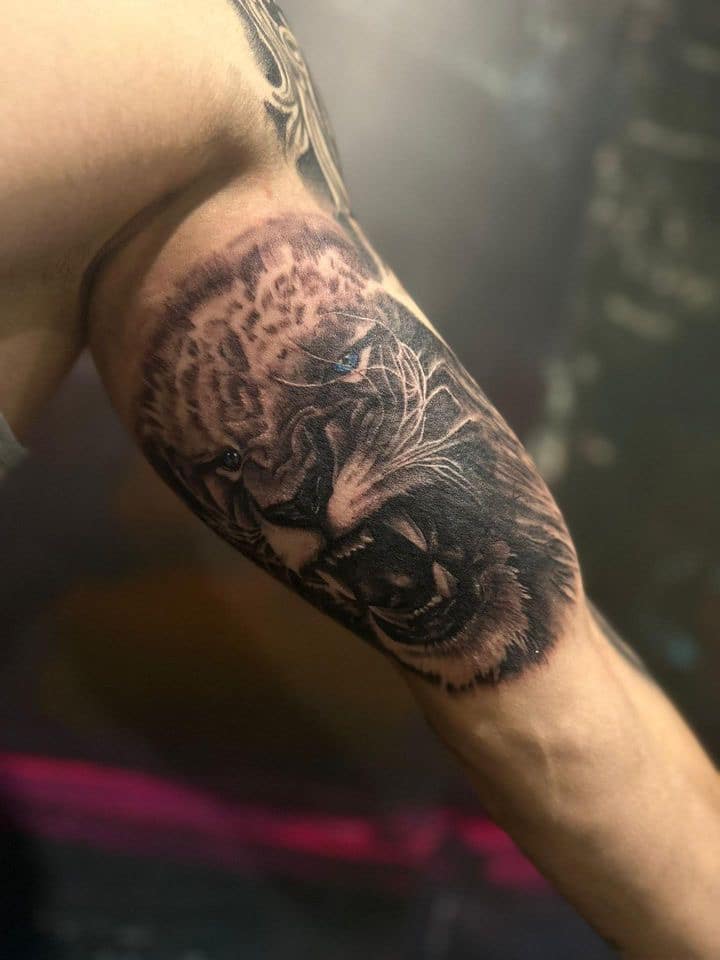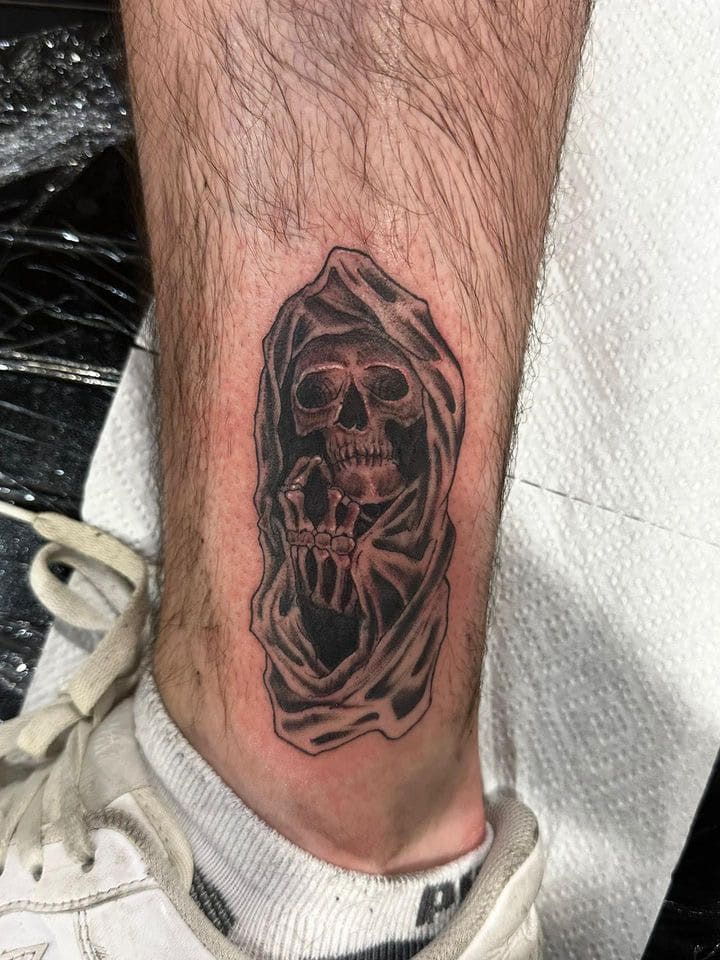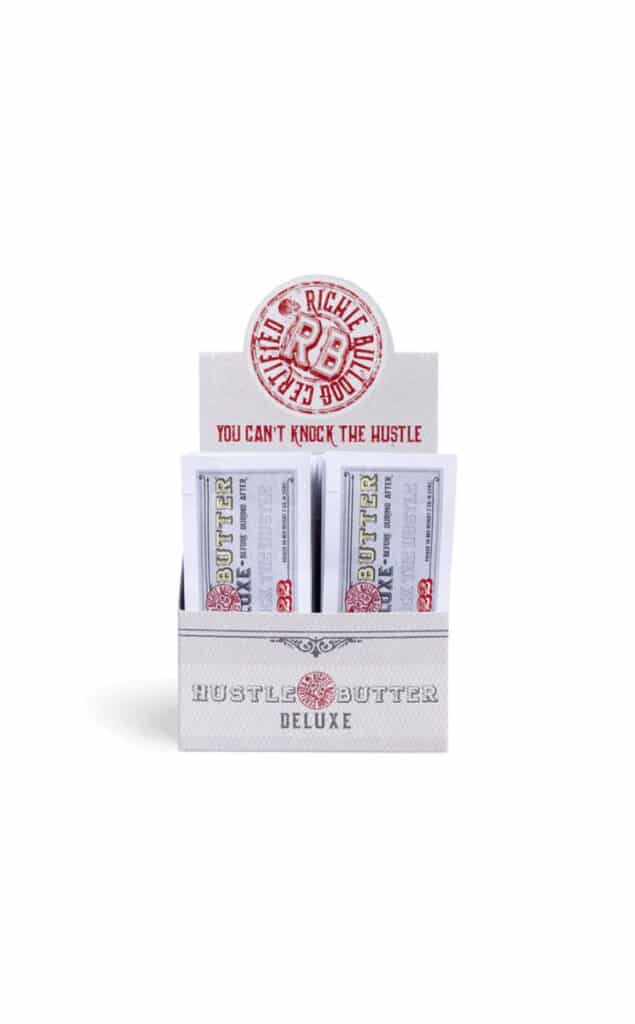Getting a tattoo is an exciting experience, but the real art lies in ensuring a smooth and beautiful healing process. In this blog, we’ll walk you through the stages of tattoo healing, the factors that influence recovery time, and expert aftercare tips to ensure your tattoo stands the test of time.
The Importance of the Tattoo Healing Process
Embarking on the tattoo healing journey is a crucial and intricate process that requires proper care and attention. By understanding a few basics on tattoo care, we can simplify things significantly. By familiarising yourself with the stages of tattoo healing, understanding what factors impact healing time, and following the essential steps for promoting healthy recovery, you can ensure that your tattoo remains beautiful and vibrant for years to come!

The Stages of Tattoo Healing
The healing process of a tattoo can be divided into several stages. Immediately after getting a tattoo, the area will be red, swollen, and sensitive. This is normal and is a result of the trauma caused to the skin during the tattooing process.
Days 1-2
During days 1-2 you will notice your tattoo oozing. This is completely normal and indicates that your body is working to heal your new tattoo. The excretion of excess ink and blood plasma from the wound is a natural part of the healing process. The presence of blood plasma against the wound plays a vital role in stimulating and speeding up the healing process.
Days 3-5
From day 3 onwards, the oozing will stop and a scabs will form over the tattoo as the body begins to repair the damaged skin. It’s important to resist the temptation to pick at the scab, as this can lead to scarring and colour loss. The scab will be soft, and the area will feel itchy, resist the urge to scratch it! as this can damage your new tattoo and lead to infection. If the oozing continues after days 5-6, consult your doctor as the tattoo may have become infected.
Days 5-7
As the rest of the week continues, the scabs will harden, and along with the surrounding skin, will start to peel and flake off, revealing a layer of new, healing skin underneath. This is a crucial stage in the healing process, as the new skin is delicate and vulnerable. Make sure to keep this new healing skin clean and out of direct sunlight without protection.
Week 2-4
During week 2 and 3, the healing skin has sealed, but will still be sore, itchy and sensitive. Continue to follow the advice of your tattoo artist and apply your tattoo aftercare cream or balm. If the itching becomes unbearable, check with your doctor as the tattoo may have become infected. It’s important to keep the area clean and moisturised to prevent infection and promote proper healing.
Finally, by week 4 the tattoo will fully heal, and the skin will regain its normal appearance. The tattoo may still look a little dull for a couple of weeks as the new skin settles but you shouldn’t have any discomfort. It’s crucial to follow proper aftercare practices outlined by your tattoo artist at each stage to ensure a smooth healing process.
Factors that Affect Tattoo Healing Time
Several factors can influence how long it takes for a tattoo to heal. The size and complexity of the tattoo play a significant role, whether that be a small fine line tattoo, or a large sleeve tattoo with lots of shading, larger tattoos generally require more time to heal, but this depends on the individual, as everyone has a different healing journey. The location of the tattoo also affects healing time, as areas with more blood flow tend to heal faster.
Additionally, individual factors such as age, overall health, and immune system function can impact healing time. It’s important to note that everyone’s healing process is unique, and it’s essential to listen to your body and give your tattoo the time it needs to heal properly.
Tattoo Aftercare Tips for Faster Healing
Proper aftercare is essential for promoting faster healing and ensuring the longevity of your tattoo. Here are some tips to help you take care of your tattoo during the healing process:
- Keep the area clean: Gently wash your tattoo with mild, fragrance-free soap and lukewarm water. Avoid scrubbing or rubbing the area, as this can irritate the skin.
- Moisturise regularly: Apply a thin layer of fragrance-free, non-comedogenic moisturiser to keep the tattooed area hydrated. Avoid petroleum-based products, as they can clog pores and hinder the healing process.
- Avoid direct sunlight: Protect your tattoo from the sun’s harmful UV rays by covering it with clothing or applying a broad-spectrum sunscreen with a high SPF.
- Avoid swimming and excessive sweating: Immersion in water and excessive sweating can introduce bacteria to the healing tattoo, leading to infection. Avoid swimming and intense physical activities until your tattoo is fully healed.
- Resist the urge to scratch or pick: Itchiness is a normal part of the healing process, but scratching or picking at your tattoo can disrupt the healing and cause scarring.

Potential Tattoo healing Problems & How to Address Them
While most tattoos heal without complications, there are some potential issues that may arise during the healing process. These include infection, allergic reactions, excessive scabbing, and colour loss. If you notice any signs of infection such as increased pain, redness, swelling, or discharge, it’s crucial to seek medical attention immediately. Allergic reactions can manifest as itching, rash, or hives. If you experience these symptoms, consult your tattoo artist or a healthcare professional for
guidance. To minimise scabbing and colour loss, follow proper aftercare instructions and avoid picking or scratching the tattooed area.
Tips to Promote Healthy Tattoo Healing
Promoting healthy tattoo healing starts with proper aftercare. In addition to the tips mentioned earlier, here are some additional steps you can take to ensure optimal healing:
- Follow your tattoo artist’s aftercare instructions: Your tattoo artist at InkZu will provide you with aftercare information specific to your tattoo. It is important to follow their instructions carefully to ensure you get the best results….
- Avoid tight clothing: During the healing process, opt for loose-fitting clothing to prevent friction and irritation on the tattooed area.
- Maintain a healthy lifestyle: Eating a balanced diet, staying hydrated, and getting plenty of rest can support your body’s natural healing process.
- Avoid exposing your tattoo to harsh chemicals: Chemicals found in cleaning products, beauty products, and even some fabrics can irritate the healing tattoo. Be mindful of what comes into contact with your tattooed skin.

Tattoo Aftercare Products & Recommendations
Choosing the right aftercare products can significantly impact the healing process of your tattoo. Look for products specifically formulated for tattoo aftercare, such as fragrance-free, non- comedogenic moisturisers and mild, unscented soaps. Avoid using products that contain alcohol, fragrances, or harsh chemicals, as they can irritate the skin and hinder the healing process. Consult your tattoo artist for their recommended aftercare products, as they may have specific brands they trust and recommend.
Get Your Dream Tattoo, Book In Today With InkZu
When it comes to the healing process of your tattoo, the team at InkZu Tattoos will ensure you receive the best care and aftercare tips tailored to your tattoo experience. Whether it’s your first time getting inked or you’re returning for another masterpiece, we understand the importance of proper healing and long-lasting results. Our tattoo artists take immense pride in their work and will provide you with detailed instructions on how to care for your fresh ink. From keeping it clean and moisturised to avoiding direct sunlight and tight clothing, following these tips will ensure your tattoo heals beautifully and maintains its vibrancy for years to come.
